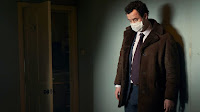Watched yesterday the first episode of “Des” (the second one has already aired, but we decided to go on the catchup service and set our own schedule): a solid 9/10 from me by far.
Attention: mild spoilers ahead
ITV has always been great at depicting the authenticity of a historical environment in their most popular crime/detective shows, beating the BBC in many cases here (Agatha Christie’s Poirot, Prime Suspect, Endeavour, Midsomer Murders, to name a few), and “Des” is seemingly continuing this tradition.
It is not that hard to recreate 1983 (when Nilsen was caught by the Met police) with its longstanding political crisis and large number of destitute characters, because it wasn’t that long time ago: people of the older generation vividly remember the ongoing havoc with lengthy queues outside the JobCentres.
The story of the Muswell Hill Murderer Dennis Nilsen is well known due to the coverage by the media at the time and Nilsen’s later biography, a book by Brian Masters, “Killing for company,” based on a series of interviews with Nilsen after his apprehension. The first episode was focused on the revealing the identity of the new serial killer on the London scene and the beginning of an exhausting psychological duel between Nilsen (the named killer) and Masters.
I am grateful to the creators of “Des,” who decided not to show the audience any gore from the gruesome story of Nilsen’s killings (nobody still knows for certain how many victims he left behind: the numbers vary from 12 to 15): what we are seeing is the unfolding of a macabre story about a truly intelligent man, who started murdering young and vulnerable people not only out of morbid curiosity (not that uncommon amongst psychopaths, of course), but also out of a pathologically perverted idea of curing his solitude by surrounding himself by statuesque cadavers “in Michelangelo’s poses.”
His disdain towards the posh and contemptuous Masters, who at first regarded Nilsen as a by-product of a chthonic vulgarity (Masters is changing his mind in front of our very eyes)—“yes, I know what you are thinking of me, with your ‘right sort of accent’”—is chilling.
Needless to say how brilliant David Tennant is as Nilsen: his own, slightly exaggerated for the show, Scottish accent (not his native Paisley, though, but another, from Aberdeen) gives even more uncanny vibes of similarity with his prototype.
The only critique from me of the series is that filmmakers decided—yet again—to use the same old trope “a disturbed Chief Inspector with a complicated family history”; I find it redundant and boring, not being interested whatsoever in the potential complexities of someone’s marriage.
But, overall, the show is worth watching, and I strongly recommend it.





No comments :
Post a Comment